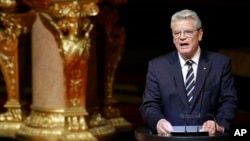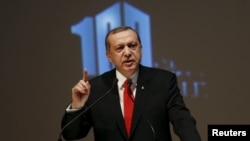German President Joachim Gauck for the first time Thursday called the World War I massacre of 1.5 million Armenians a genocide and said Germany bears some of the responsibility.
Gauck said at a service in the Berlin Cathedral that as a wartime ally of the Ottoman Empire, German soldiers took part in planning and implementing deportations of Armenians.
"Women, men, children, and the elderly were indiscriminately sent on death marches, banished without any protection or food to the steppe and the desert, burned alive, chased, beaten, and shot to death," he said. "This planned and calculated criminal act targeted Armenians for a sole reason: because they were Armenians."
The German parliament is due to vote on a genocide motion Friday, which Ankara has downplayed as a potential point of diplomatic confrontation with Berlin. Prime Minister Ahmet Davutoglu recently said the German government has already indicated it will not use the word.
Germany is Turkey's biggest trading partner.
Turkey vigorously denies the killings of Armenians by Ottoman Turks was a genocide, saying Armenians died during fighting in a civil war in which they were aided by the Russians. It also says the number of deaths is far fewer than 1.5 million.
Turkey formally protests against any government that calls the killings a genocide. It recalled its representative to the Vatican earlier this month after Pope Francis called the Armenian massacre the first genocide of the 20th century.
Addressing a meeting billed as an international peace summit in Istanbul Thursday, Turkish President Tayyip Erdogan also accused the international community of indifference toward refugees and wanting migrants to drown at sea.
The international gathering coincided with reignited diplomatic tensions with Austria, which earlier this week called the mass killings genocide.
"We will never accept these lies against our country," said Erdogan. "No country is more innocent and clean than Turkey in these events."
The president went on to criticize Armenia for its genocide claims and called on Yerevan officials to join with Ankara by opening archives for historians to determine what happened.
Prime Minister Davutoglu, addressing Turkey's parliament Thursday, also warned countries against recognizing the incident as genocide.
"Those who develop a discourse of hatred against Turkey will be shamed and will pay in the face of history and humanity," he said.
Ankara received another blow with Russian President Vladimir Putin supporting genocide claims.
Erdogan, however, welcomed reports U.S. President Barack Obama will not use the word genocide in his annual speech remembering Armenian victims of the mass killings.
The Armenian church granted sainthood to the victims during a service Thursday in Echmiadzin, a town that provided sanctuary for those escaping the killings.
Hundreds of thousands of people are in the Armenian capital Yerevan to commemorate Friday what historians say was the start of the massacre 100 years ago.
Portions of this report are from AP.





